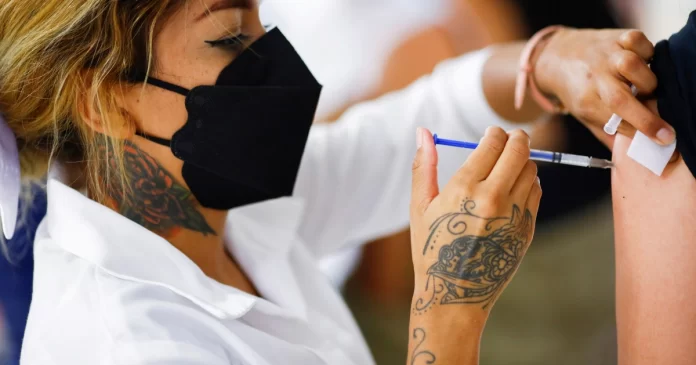But the new vaccine patent waiver proposal being pushed by the European Union and the head of the World Trade Organization is worse than no deal at all.
Global health is on its deathbed. For almost two years, a handful of rich countries have resisted a life-saving proposal tabled by India and South Africa that could speed up global COVID-19 vaccination, making a mockery of the World Trade Organization (WTO). Now, these countries are attempting to stitch up the process in order to put the profits of big pharma over people’s lives.
This month, a crucial and long-delayed meeting will take place at the WTO on the rules governing vaccine formulas. After two years of failed negotiations, the WTO needed an agreement to be reached.
Ahead of these meetings, a damaging new proposal has emerged that is being pushed by the European Union and WTO Director-General Ngozi Okonjo-Iweala. This proposal would be worse than none at all.
India and South Africa’s original proposal, for an intellectual property rights waiver related to coronavirus vaccines and treatments, would speedily democratise COVID-19 vaccine and drug production; the new one would not. In fact, it would actually add more barriers to countries seeking to produce or import generic supplies. Yet this is the text that is currently being negotiated at the WTO.
It’s hard to see this as anything other than a stitch-up. By pushing this new proposal, the WTO is blocking discussion of a return to the original waiver (despite its massive support) and giving too much voice and power to the rich countries protecting the interests of pharma. In a desperate attempt to get an outcome – and save face for the WTO – both democracy and a meaningful outcome are being sacrificed.
When South Africa and India spearheaded the initiative in 2020, more than 100 countries – including my own, Mexico – joined them in demanding the right to technologies that could protect our people. Our efforts met fierce resistance, especially from the EU and the United States.
The coronavirus will not be controlled by a mighty swarm of scientists. Its end will be slow and gradual and will require sustained coordination among nations to execute the most appropriate public health interventions for each context and time.
When the Omicron variant caught the world off-guard earlier this year, John Nkengasong, the director of the Africa Centres for Disease Control and Prevention, wrote that “the world must finally learn from past mistakes”. That resonated with me.
COVID-19 is not my first pandemic. When the H1N1 influenza virus shut down Mexico City and swept the world in 2009, I played a central role on the Mexican health ministry’s team that worked around the clock to curb the virus’s spread. We were prepared for many things – infection surges, supply shortages, and communication mishaps – but not political opportunism.
The EU plan protects everything that is wrong with the current international health order. It allows big pharmaceutical companies to not share life-saving technology, keeps numerous countries of the Global South in the begging queue, and pretends that borders can keep out mutations. Their proposed text is nothing more than a PR stunt intended to kill off the possibility of a genuine intellectual property waiver.
- Proposed EU law has been criticized for posing a risk to biodiversity.
- European Union’s Vaccination Program Running at Half the Pace of U.S.
It pays little heed to Africa CDC’s goal to scale up the availability of rapid, at-home antigen tests so that at least 200 million people will have access to these tests by the end of this year.
Africa’s low vaccination rates mean that the trajectory of the pandemic on the continent remains unpredictable and uncertain, John Nkengasong warned, arguing that “equitable access to drugs that treat COVID-19 is key, so that people who test positive can quickly take drugs early on, when they are most effective.”
Neither tests nor treatments are covered under the proposal currently being discussed. Paxlovid, the latest COVID-19 pill to be granted an emergency use authorisation by the US Food and Drug Administration (FDA), is likely already inaccessible.
Back in March, Pfizer responded to a request to obtain a compulsory license to produce Paxlovid in the Dominican Republic with staunch opposition, detailed in this 45-page submission. It was unsurprising, given that Pfizer’s earnings call from February reveals it expects to make close to $22 billion in revenue from Paxlovid sales.
Economists, parliamentarians, and public health experts from around the world have criticised the counterproposal, calling it “a sham”. In December last year, 2.5 million nurses from 28 countries, convened by Progressive International and Global Nurses United, filed a complaint against these governments for “gross violation of human rights”. They are right. As a public servant, I value the space for debate and deliberation, and willingness to negotiate in the face of tough choices. But as far as the proposal being negotiated stands, we have not been offered a choice – only capitulation.
As we enter the third year of the COVID-19 pandemic, we must urgently free the WTO from the clutches of Big Pharma. The only way out of this pandemic is to break their monopolies and empower every factory, manufacturer, scientist, and healthcare worker to produce and deliver life-saving medication.
The WTO has failed us during this pandemic and refused to waive its rules that block equitable access to life-saving technologies. Its rules have prioritised profits over people, even in the midst of a pandemic. The EU, United Kingdom, and Switzerland have blocked the appeals of lower-income countries’ governments as they watched their people die when the vaccine technology existed to save them. Rich countries must give ground and return to a text closer to that originally proposed by South Africa and India. And the WTO must begin to act on behalf of all the countries it claims to represent—not on behalf of a few rich countries in the pockets of the pharmaceutical giants.





